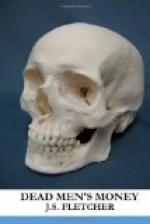“He did not, then,” she said. “He was in here having his tea at six o’clock that evening, and he went away to the shop when he’d had it, and I never put my eyes on him again, alive, your honour. He was never home that night, and he didn’t come to his breakfast next morning, and he wasn’t at the shop—and I never heard this or that of him till they come and tell me the bad news.”
I knew then what must have happened. After I had left him, Crone had gone away up the river towards Tillmouth—he had a crazy old bicycle that he rode about on. And most people, having heard Nance Maguire’s admissions, would have said that he had gone poaching. But I was not so sure of that. I was beginning to suspect that Crone had played some game with me, and had not told me anything like the truth during our conversation. There had been more within his knowledge than he had let out—but what was it? And I could not help feeling that his object in setting off in that direction, immediately after I had left him, might have been, not poaching, but somebody to whom he wished to communicate the result of his talk with me. And, in that case, who was the somebody?
But just then I had to leave my own thoughts and speculations alone, and to attend to what was going on between my principal and Nance Maguire. Mr. Lindsey, however, appeared to be satisfied with what he had heard. He gave the woman some further advice about keeping her tongue still, told her what to do as regards Crone’s effects, and left the cottage. And when we were out in the main street again on our way back to the office he turned to me with a look of decision.
“I’ve come to a definite theory about this affair, Hugh,” he said. “And I’ll lay a fiver to a farthing that it’s the right one!”
“Yes, Mr. Lindsey?” said I, keenly interested at hearing that.
“Crone knew who killed Phillips,” he said. “And the man who killed Phillips killed Crone, too, because Crone knew! That’s been the way of it, my lad! And now, then, who’s the man?”
I could make no reply to such a question, and presently he went on—talking as much to himself, I think, as to me.
“I wish I knew certain things!” he muttered. “I wish I knew what Phillips and Gilverthwaite came here for. I wish I knew if Gilverthwaite ever had any secret dealings with Crone. I wish—I do wish!—I knew if there has been—if there is—a third man in this Phillips-Gilverthwaite affair who has managed, and is managing, to keep himself in the background. But—I’ll stake my professional reputation on one thing—whoever killed Phillips, killed Abel Crone! It’s all of a piece.”




